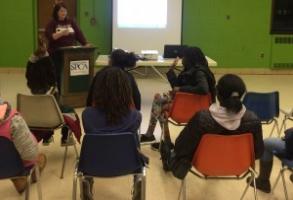Student Studies Connection of Abusive Treatment of Humans and Animals
Ph.D, 2001, Princeton University
M.S., Conflict Analysis and Resolution, George Mason University
B.A., Political Science, Philosophy, Regis University, Denver Colorado
 |
Growing up in rural Georgia and Florida, George Mason University graduate student Mandy Hood routinely saw animals mistreated at the hands of their human caretakers. But she noticed something even more disturbing too.
“If the animals are abused at home, generally so are the kids,” she says.
At a young age, she made a strong connection between the two.
“Violence and the mistreatment of animals reflect how you view and interact with the rest of society. It’s a creative way to think about violence prevention,” she says.
Hood, who lives in west Philadelphia, is doing her studies entirely online, a growing trend in higher education but a new experience for her.
“I was worried when I started the course because I wasn’t used to an online program. But I think it’s been better for me,” she says. “It’s harder than showing up to class and because of that it’s made me more creative. It’s pushed me to try harder than if everything was at my fingertips.”
Hood is a master’s student in her second year in the degree program at Mason’s School for Conflict Analysis and Resolution (S-CAR). She’s in a directed individual study course and has, she says, “figured out how to do the program and work with my community simultaneously in order to have the same education and experience as traditional master’s students.” Hood says her professor, Leslie Dwyer, and Lisa Shaw, director of S-CAR’s student services for have been extremely supportive, even at a distance of 145 miles.
Hood says her professor, Leslie Dwyer, and Lisa Shaw, director of S-CAR’s student services for have been extremely supportive, even at a distance of 145 miles.
“They see the vision beyond the treatment of animals,” she says. “When you talk about animal abuse and violence, some people roll their eyes. But [Mason faculty] see that animals break down political and cultural barriers. Animals provide us with a chance to challenge violence and discrimination. They teach us how to heal.”
“She has been extraordinary,” says Dwyer, a cultural anthropologist who has taught at Mason since 2009. “Distance learning is more challenging; she has to be real proactive in retaining connections with faculty that other students take for granted.”
Dwyer says in her experience Hood is the first student to join the concept of combating human violence with animal violence.
“She wants to create a curriculum that uses S-CAR perspectives that would be used by humane societies and animal welfare groups to teach young people how to think differently, not only about their relationships with animals but also with other communities. It’s a first.”
Hood is already using her ideas in education settings, including appearances at local SPCA branches, where she teaches how to understand an animal’s body language in relation to human behavior.
“I ask students ‘What is this animal telling you? Is it afraid?’ How should we interact with this animal?’”
Her partner in her travels is Meena, the dog she adopted from a no-kill shelter three years ago.
“She’s a nervous dog and refuses to go for walks and do normal dog stuff,” she says. “I try to see [her behavior] as a form of civil disobedience.”
###
Photo: Mandy Hood shares her humane treatment ideas with a Girl Scout troop at an SPCA meeting. Photo courtesy of Mandy Hood.
This material is presented as the original analysis of analysts at S-CAR and is distributed without profit and for educational purposes. Attribution to the copyright holder is provided whenever available as is a link to the original source. Reproduction of copyrighted material is subject to the requirements of the copyright owner. Visit the original source of this material to determine restrictions before reproducing it. To request the alteration or removal of this material please email [email protected].
rosters
IMPORTANT LINKS
- Home
- Admissions
- Academics
- Research & Practice
- Center for Peacemaking Practice
- Center for the Study of Gender and Conflict
- Center for the Study of Narrative and Conflict Resolution
- Center for World Religions, Diplomacy, and Conflict Resolution
- Indonesia - U.S. Youth Leadership Program
- Dialogue and Difference
- Insight Conflict Resolution Program
- Parents of the Field Project
- Program on History, Memory, and Conflict
- Project on Contentious Politics
- Sudan Task Group
- Undergraduate Experiential Learning Project
- Zones of Peace Survey
- News & Events
- Student and Career Services
- Alumni
- Giving






